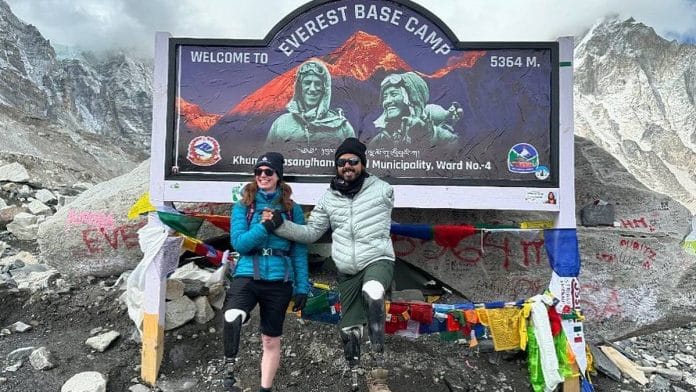The Maharashtra government’s decision to award Rs 11 crore to the Indian Men’s Cricket Team for their T20 World Cup victory raises critical questions about funding priorities in sports when it comes to taxpayer money. Celebrating national achievements is important, but if the government has surplus resources, shouldn’t these be directed toward more inclusive public interests? Could they be used to support persons with disabilities in their sporting activities?
These questions become even more pressing when we consider the financial struggles faced by adventurers with disabilities, such as Tinkesh Kaushik—a triple amputee who successfully trekked to Everest Base Camp in May 2024.
Mountain of financial difficulties
Adventure sports epitomise human resilience and the quest for discovery. Yet for persons with disabilities—such as the blind, amputees, or hearing-impaired—the pursuit of these activities is not just a physical challenge but also a substantial financial hurdle. The exorbitant costs of specialised equipment required for activities like tandem cycling, high-altitude trekking, or mountaineering, along with required support services, create formidable barriers to entry despite available opportunities.
At present, hopes are vested in private initiatives, like the Goa-based Tinkesh Ability Foundation (TAF), an NGO established by Tinkesh Kaushik, the world’s first triple amputee to reach Everest Base Camp.
Kaushik himself struggled to raise funds for his own trek and for promoting mobility and psychological wellbeing among persons with disabilities (PWDs). TAF’s current fundraising campaign on a crowdsourcing platform aims to support a group of adventurers with disabilities on their trek to Everest Base Camp. This initiative is about more than just funding an expedition; it’s a potent statement on the inclusivity of adventure itself. Committed to providing mobility aids, inclusive fitness spaces, and mental health support, TAF strives to enhance the lives of PWDs across India.
Role of foundations and fundraisers
By raising funds to cover the costs of equipment and support, organisations like TAF play a crucial role in bridging the financial gap. They enable persons with disabilities to participate in life-enriching activities like the Everest base camp trek. More importantly, they help shift the narrative from disability to possibility.
This effort also serves a broader societal function by showcasing the capabilities of individuals with disabilities, fostering a more inclusive view of adventure and athleticism. Each funded expedition chips away at the prejudices that often sideline these capable adventurers.
The benefits of such initiatives extend beyond the immediate participants. They challenge our perceptions of what is possible for persons with disabilities. They encourage other organisations to think inclusively and act similarly, potentially leading to more widespread changes in how adventure sports are structured and funded.
Moreover, these stories inspire other individuals with disabilities to pursue their adventure dreams, knowing that there are support systems that can make these dreams possible. They send a compelling message: adventure is for everyone, and physical limitations do not define one’s capacity to explore and achieve.
Also Read: Uttarkashi DM is drafting safety rules—9 trekkers didn’t have to die for govt to wake up
Toward more equitable sports funding
Instead of allocating large sums to already well-compensated sports stars, state governments could consider establishing a public fund to support a broader range of athletes, including para-athletes and adventurers with disabilities. Such a fund could help address the financial barriers that often sideline these athletes, providing them with the necessary resources to train, compete, and excel in their respective sports.
By redirecting some of the funds to create a more balanced and inclusive sporting environment, governments can make a lasting impact, ensuring that every athlete has the opportunity to pursue greatness, irrespective of their physical challenges or the popularity of their sport.
While the path to inclusivity in adventure sports is undoubtedly challenging, it is also immensely rewarding. The efforts of the Tinkesh Ability Foundation and similar entities are critical in this journey toward equality.
As a society, it is our responsibility to support and amplify these efforts, ensuring that every individual has the opportunity to experience the transformative power of adventure. Through encouraging such initiatives, we can pave the way for a truly inclusive outdoor sports culture, where the thrill of adventure and the growth it fosters are accessible to all who seek it.
Anusha Subramanian is an independent journalist, mountaineer, and entrepreneur who has been writing specifically about adventure and mountaineering for over a decade. She posts under @sanushas. Views are personal.
(Edited by Asavari Singh)






